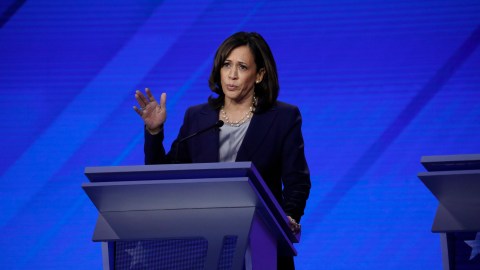Kamala Harris drops out of 2020 presidential race

Photo credit: Heidi Gutman / Contributor
- U.S. Sen. Kamala Harris of California announced Tuesday that she was ending her presidential campaign due to a lack of financial resources.
- Harris had once been considered one of the top candidates in the Democratic field, but her support has been falling in national polls since the summer.
- Former Vice President Joe Biden currently leads the Democratic field, with an average of 27 percent support in national polls.
Sen. Kamala Harris dropped out of the 2020 presidential race on Tuesday, narrowing the Democratic field of candidates to 15. Harris cited a lack of campaign resources as the main reason for exiting the race. She was polling at 2 percent on Monday.
“Eleven months ago at the launch of our campaign in Oakland I told you all: ‘I am not perfect.’ But I will always speak with decency and moral clarity and treat all people with dignity and respect. I will lead with integrity. I will speak the truth. And that’s what I have tried to do every day of this campaign. So here’s the truth today,” Harris wrote in a note to supporters. “I’ve taken stock and looked at this from every angle, and over the last few days have come to one of the hardest decisions of my life. My campaign for president simply doesn’t have the financial resources we need to continue.”
The move comes just two weeks before the next presidential debate on Dec. 19, for which she had qualified, and two months before voting begins in the election. It also comes days after The New York Times published a piece detailing her crumbling campaign.
It’s an early exit for a candidate who once posed the biggest threat to front-runner former Vice President Joe Biden. In June, Harris surged in the polls after confronting Biden on the debate stage over his record on busing and race, and soon after was earning about 20 percent national support. But in the following months that enthusiasm dwindled.
One reason enthusiasm dwindled was Harris’ somewhat ambiguous brand. The California senator seemed to bounce between the progressive and moderate poles of the Democratic field, and during her campaign she switched positions on issues such as health care (she once supported the elimination of private health care, then introduced a plan that would allow it) and the federal government’s role in busing policies (she eventually said her stance was the same as Biden’s).
Harris had also faced criticism from progressives over her relatively “tough on crime” record as a prosecutor in California.
“In her career, Ms. Harris did not barter or trade to get the support of more conservative law-and-order types; she gave it all away,” wrote Lara Bazelon, a law professor and former director for the Loyola Law School Project for the Innocent in Los Angeles, in a New York Times op-ed.
Where does this leave the Democratic field?
So far, six candidates — Joe Biden, Pete Buttigieg, Kamala Harris, Amy Klobuchar, Bernie Sanders and Elizabeth Warren — have qualified for the December debate in Los Angeles. The national polling average shows Biden leading the pack:
- Joe Biden — 27 percent
- Elizabeth Warren — 22 percent
- Bernie Sanders — 18 percent
- Pete Buttigieg — 8 percent
The candidates Andrew Yang, Cory Booker, Amy Klobuchar and Tulsi Gabbard all show between 2 and 3 percent support.
One of the most visible effects of Harris leaving the field is that the debate stage will feature only white candidates, unless Booker, Gabbard or Yang pick up more support before the Dec. 12 deadline. Beyond that, Harris’ departure has freed up campaign staffers and donor dollars that might now start flowing to other Democratic candidates.
The question is to whom? It’s not yet clear, but it seems safe to say that the more progressive candidates — Warren and Sanders — are less likely to benefit than more moderate candidates like Biden, Buttigieg and, potentially, Michael Bloomberg.





